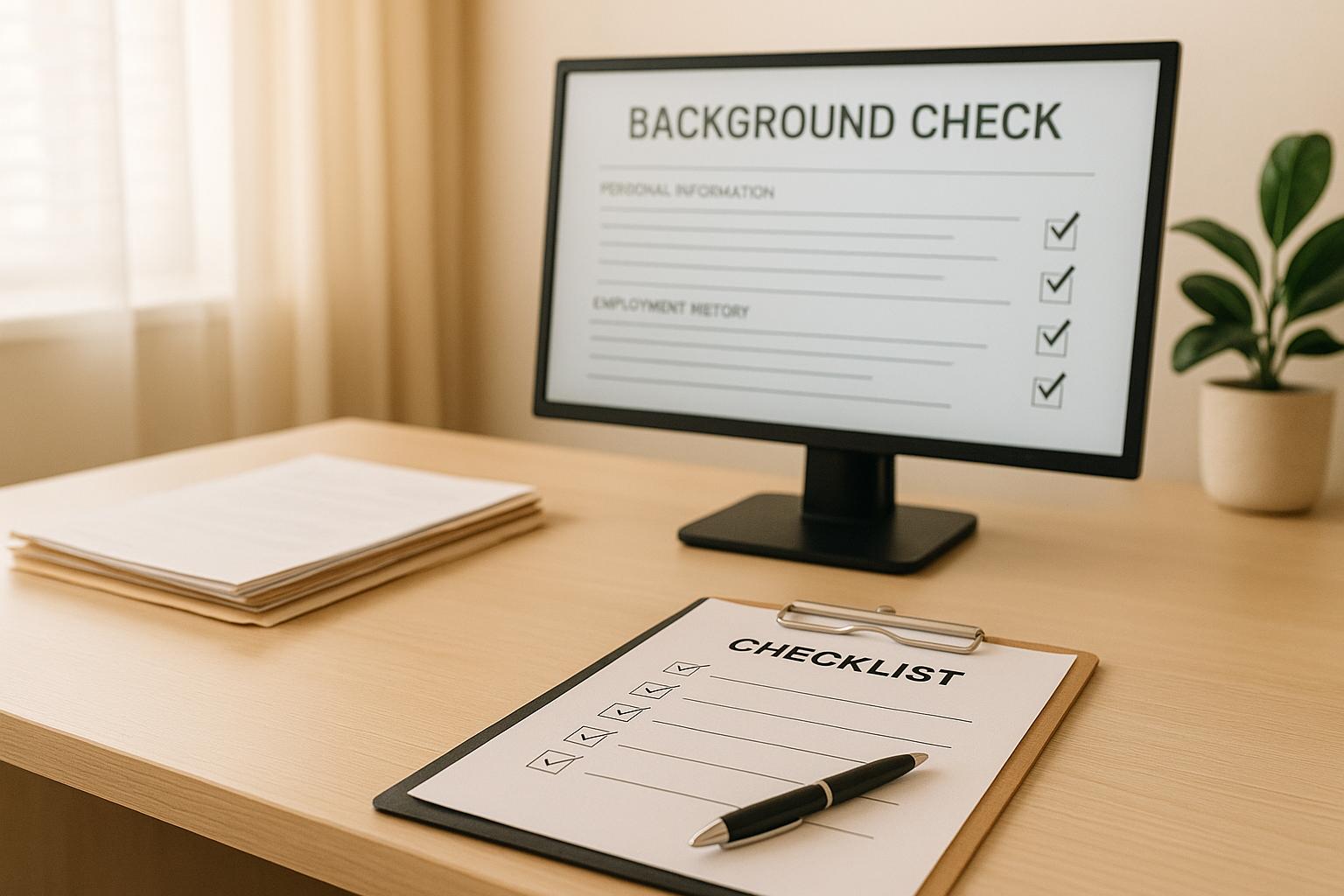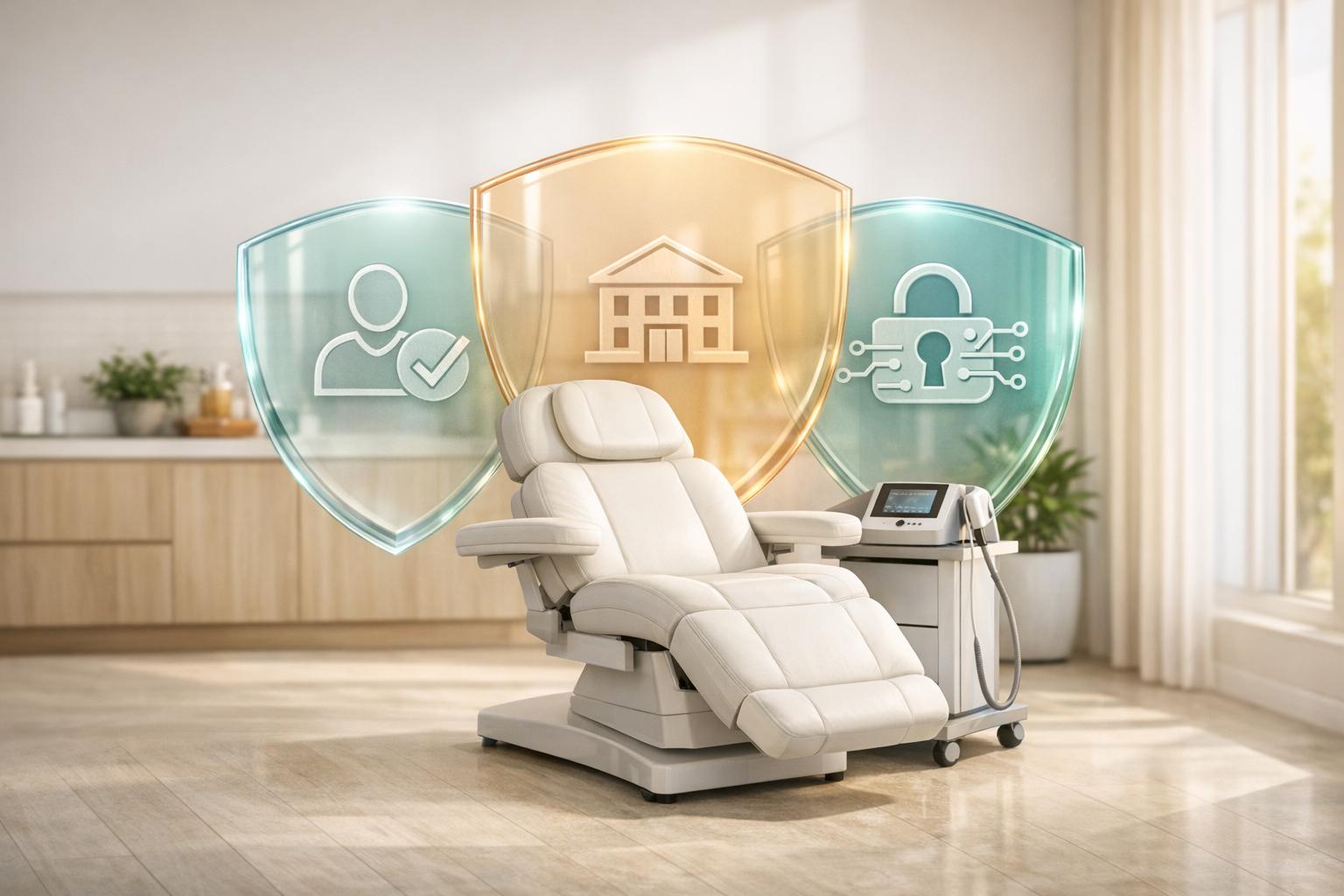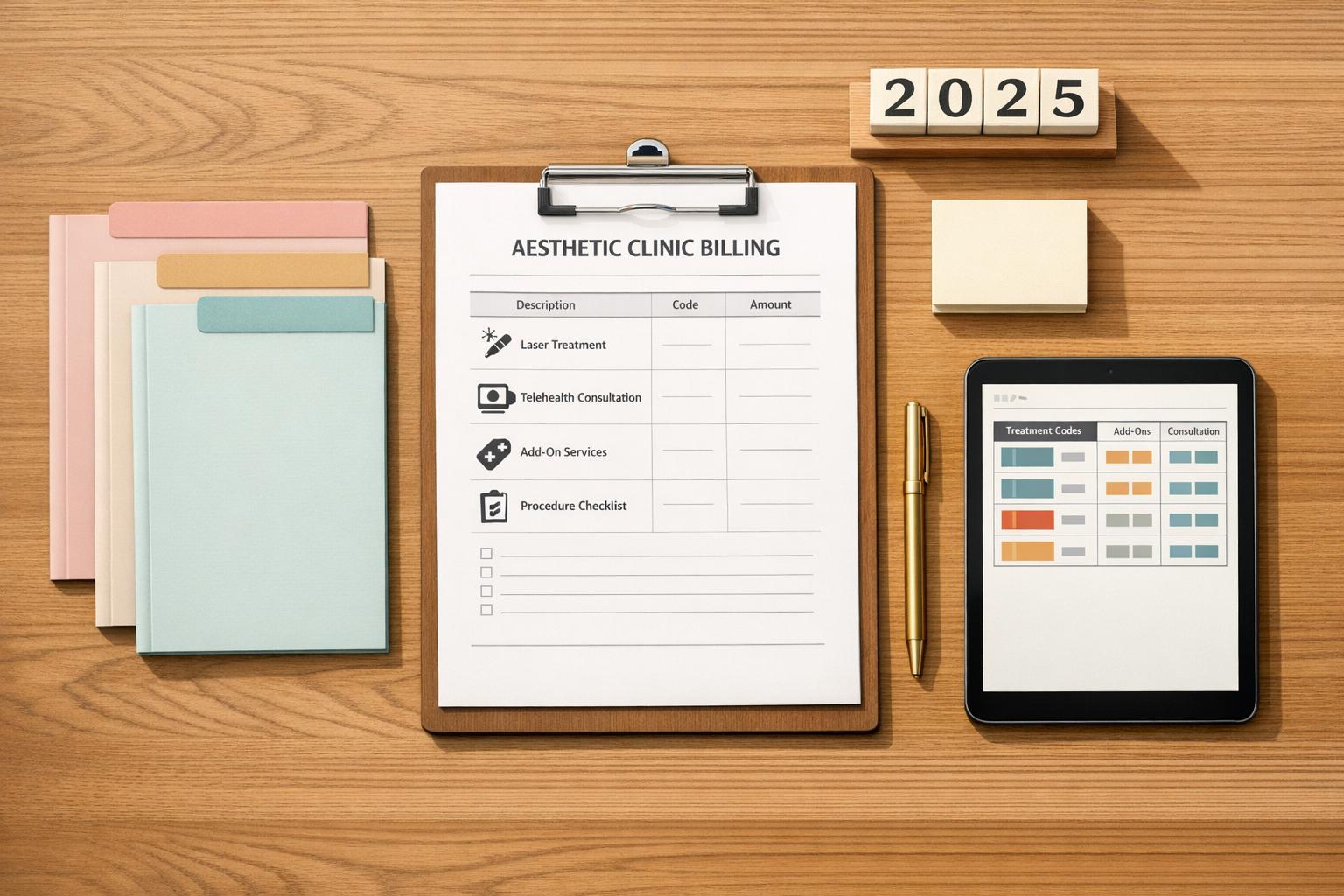Hiring the right staff for your med spa is critical for patient safety, compliance with regulations, and protecting your business reputation. Background checks help ensure that every team member is qualified, trustworthy, and meets legal requirements. Here's what you need to know:
- Patient Safety: Staff handle sensitive medical information and perform procedures requiring medical oversight.
- Regulatory Compliance: Many states mandate license and certification verification for med spa roles.
- Business Protection: Background checks reduce risks like theft, fraud, or liability from unqualified hires.
Key Steps for Effective Background Checks:
- Criminal History Screening: Focus on offenses related to violence, theft, fraud, or healthcare misconduct.
- License & Certification Verification: Confirm that all medical and specialty credentials are valid and up-to-date.
- Employment & Education History: Verify prior roles, responsibilities, and qualifications to avoid falsified claims.
- Follow Legal Guidelines: Comply with federal laws like the FCRA and HIPAA, and always get written consent from applicants.
- Use Professional Screening Services: Partner with providers experienced in healthcare regulations for accurate results.
By combining thorough checks with secure, technology-driven tools, med spa owners can hire confidently while minimizing risks.
What to Include in Med Spa Background Checks
When it comes to med spa background checks, they need to be thorough and tailored to the responsibilities of each role. This means evaluating criminal history, verifying credentials, and reviewing work experience to ensure candidates are well-suited for their positions.
The level of scrutiny should align with the role. For example, licensed medical professionals like nurse practitioners and physician assistants require more extensive screening than administrative staff. However, since every role involves some level of patient interaction or access to sensitive information, background checks are essential for all positions. These checks form a critical foundation for the legal and procedural steps covered in the next sections.
Criminal History Screening
Criminal background checks are a crucial part of the hiring process. It’s important to note that not all offenses carry the same weight in a healthcare setting. Felonies related to violence, theft, fraud, or healthcare misconduct - and even certain misdemeanors like prescription abuse or privacy violations - should raise serious concerns.
The timing of these offenses is also significant. Many standard background checks cover a seven-year period, but certain states allow older convictions to be considered, especially for healthcare roles. Financial crimes, such as embezzlement or credit card fraud, are particularly concerning in med spa environments, where employees may handle expensive equipment and sensitive payment information.
License and Certification Verification
Verifying professional licenses and certifications is a critical step to safeguard patients, protect your practice’s reputation, and minimize legal risks. Start by checking state medical boards, which often provide online databases to confirm the status of licenses and note any disciplinary actions. For instance, the Medical Board of California offers such resources.
For a more in-depth review, the Federation Credentials Verification Service (FCVS) provides primary-source verification of educational credentials for physicians and physician assistants. This service is accredited by NCQA and meets The Joint Commission’s standards for primary source verification. It’s a reliable way to confirm educational history for licensing and hiring purposes.
Board certifications should also be verified through organizations like the American Board of Medical Specialties (ABMS). The ABMS oversees 24 certifying boards and maintains a database of nearly one million board-certified physicians. Their information is updated daily and meets Primary Source Verification standards recognized by The Joint Commission, NCQA, and URAC.
Beyond general licenses, specialty certifications for procedures like laser treatments, injectables, or chemical peels must also be authenticated. Many states require specific training for these treatments, and ensuring certifications are up-to-date can help protect your practice from liability.
Employment and Education History
Reviewing a candidate’s employment history can reveal gaps, confirm responsibilities, and highlight any potential performance issues. Speaking with previous supervisors can provide valuable insights into a candidate’s work quality, reliability, and interpersonal skills - qualities that are especially important in patient-facing roles.
Education verification is equally crucial, particularly for clinical positions where specific degrees or training are required. This can be done by contacting educational institutions directly or using trusted verification services. Ensuring that candidates have completed the qualifications they claim is a key step in hiring the right person for the job.
Pay close attention to employment gaps, job progression, and prior healthcare experience. Unexplained gaps or frequent job changes may require further investigation. Conducting these checks not only ensures compliance with state and federal employment laws but also reinforces the standards necessary for operating in the healthcare industry.
Next, we’ll walk through the detailed process of conducting these checks in a legal and efficient manner.
How to Conduct Legal Background Checks: Step-by-Step Guide
Ensuring safety and compliance in med spas demands a thorough and legally sound background check process. To protect your business and respect the rights of job applicants, it’s essential to follow a structured approach involving clear policies, written consent, and collaboration with a professional screening service.
Create a Written Background Check Policy
Start by developing a detailed policy to guide your background screening efforts. This document should outline the types of checks you’ll conduct, the roles requiring screening, and how results will be handled. It’s important to ensure your policy complies with federal laws like the Fair Credit Reporting Act (FCRA) and Equal Employment Opportunity Commission (EEOC) guidelines, as well as any state-specific regulations.
Tailor your screening levels to different roles. For instance, licensed medical professionals may require checks on criminal history, license verification, and employment history, while administrative staff might only need basic criminal and reference checks. Set clear timelines - most checks take about 2-5 business days - and establish procedures for addressing any concerning findings.
Your policy should also cover FCRA disclosure and authorization requirements. Make sure background check disclosures are presented separately from other application materials and that you obtain written consent before starting the screening process. Train your HR team to follow these steps consistently to ensure compliance.
Get Written Consent from Applicants
Federal law requires explicit written consent from job applicants before conducting any background checks. The FCRA has specific rules about how this consent must be obtained and documented, especially in healthcare settings.
"Under the FCRA, you must provide a clear and conspicuous disclosure, separate from other documents and in a written format, saying that a background check will occur. The individual must provide written authorization for the check to proceed." - GCheck Editorial Team
The disclosure form should be simple, avoiding legal jargon that might confuse applicants. It should explain the scope of the background check and identify the screening company involved. This transparency not only helps you stay compliant but also builds trust with candidates.
Keep the consent form as a standalone document. Embedding it within other application materials violates FCRA rules. Retain signed consent forms in your hiring records as proof that proper authorization was secured.
Choose a Professional Screening Service
Working with a qualified background screening provider is key to ensuring compliance and obtaining accurate results. Look for providers familiar with healthcare regulations, including FCRA requirements, EEOC guidelines, HIPAA privacy rules, and state laws specific to medical practices.
Prioritize providers that deliver accurate reports within 2-5 business days. Delays can slow your hiring process and risk losing top candidates. Verify that the provider uses advanced security measures to protect applicant data, such as strong encryption and secure data storage practices.
Consider services that offer screening packages tailored to med spas. These might include license verifications for aesthetic procedures, checks for medical board disciplinary actions, and healthcare-specific risk assessments. Generic screening services may miss critical details unique to the healthcare industry.
Also, look for providers with tools like automated legal updates and digital consent platforms to simplify compliance. Strong customer support and flexible service options are a bonus, ensuring the screening process aligns with the unique challenges of healthcare hiring. By choosing the right partner, you can streamline hiring while maintaining legal and ethical standards.
Legal Requirements and Compliance Rules
HIPAA and Data Privacy Requirements
Med spas that handle tasks like billing, verifying eligibility, or managing electronic health records are required to comply with HIPAA. This regulation ensures the protection of patient Protected Health Information (PHI) and enforces strict data privacy standards across all operations, including background checks. Additionally, med spas must follow federal laws like the Fair Credit Reporting Act (FCRA), which oversees how background check information is collected and used. These legal requirements form the foundation for navigating other state and federal regulations tied to hiring in the med spa industry.
sbb-itb-02f5876
Using Technology to Manage Background Checks
Technology can play a key role in ensuring safety and meeting compliance standards, making background checks faster and more efficient while reducing reliance on outdated, paper-heavy processes. These tools not only save time but also help align with regulations like HIPAA and FCRA.
Store Employee Records Digitally
Switching to digital storage eliminates the risks associated with physical filing systems while meeting HIPAA requirements. Prospyr's integrated CRM and EMR system offers a secure, centralized platform for storing employee records, including background checks, license verifications, and certifications.
With HIPAA-compliant data security, sensitive employee information is encrypted, access is logged, and only authorized personnel can view specific records. For instance, med spa owners can set different access levels - HR managers can handle hiring documents, while clinical staff access only patient-related data.
Digital storage also makes audits and compliance reviews much simpler. Instead of rummaging through filing cabinets, managers can instantly retrieve background check documents using search tools or organized folders. This streamlined approach supports proactive management of certifications and renewals, which we'll explore next.
Track License Renewals Automatically
Compliance doesn’t stop after hiring - it requires ongoing attention to license and certification renewals. Missing renewal deadlines can lead to compliance issues or even disrupt operations. Prospyr's task management system is designed to track these deadlines and send automatic reminders, ensuring no one works with expired credentials.
Administrators can set up tiered reminders for upcoming expirations, delivered through email and SMS to ensure staff receive notifications via their preferred method.
By combining secure digital storage with automated reminders, the system not only reduces risks but also keeps records up to date. Renewed certifications can be uploaded to maintain a complete history, creating an audit-ready trail. This automation prevents oversights, especially for busy practitioners who might otherwise miss critical deadlines.
Add Compliance Checks to Hiring Process
Background checks can be seamlessly integrated into the hiring process using tools like Prospyr's practice management system. This ensures every compliance step is accounted for, reducing the chance of human error.
Custom digital intake forms collect all necessary documentation, including consent for background checks, without the hassle of paper forms. This ensures every hire meets regulatory requirements from the start.
The system’s task management features can create checklists that include essential steps like background check clearance, license verification, and reference checks. Progressing to the next stage of hiring is blocked until all compliance tasks are completed.
Additionally, practice analytics provide insights into hiring metrics, such as the average time to complete background checks or identifying delays in the process. This data helps med spa owners refine their hiring workflows, improving efficiency while maintaining strict compliance standards.
Conclusion: Maintaining Safety and Compliance Standards
Thorough background checks are more than just a regulatory box to tick - they're the backbone of building trust with patients and safeguarding your med spa's reputation. When clients entrust you with treatments that impact their appearance and well-being, they need to know every team member has been properly vetted and maintains up-to-date credentials.
In the aesthetics industry, patient safety is tightly linked to staff qualifications. Just one oversight in screening can lead to regulatory fines, legal troubles, and potentially irreversible harm to your practice’s reputation. Beyond meeting compliance requirements, these checks foster a professional environment where qualified staff can deliver top-tier care.
Technology has revolutionized what used to be a tedious, manual process. Prospyr’s integrated platform eliminates common issues like missed renewal deadlines, misplaced documents, and inconsistent screening practices. With secure, HIPAA-compliant storage, sensitive employee information stays protected while remaining accessible for audits and compliance checks.
Automation takes compliance management to the next level. By proactively tracking license renewals and certification deadlines, it prevents costly disruptions caused by expired credentials during daily operations or inspections.
These efficiencies free up time and energy for what truly matters - patient care and business growth. Med spa owners who pair thorough background checks with advanced technology are better equipped to minimize compliance risks and ensure staff quality. Investing in digital tools and reliable screening processes isn’t just smart - it’s essential.
FAQs
What legal requirements should med spas follow when conducting background checks on potential employees?
Med spas are required to follow federal regulations like the Fair Credit Reporting Act (FCRA), which requires obtaining written consent from job applicants before conducting background checks. They also need to comply with state-specific rules, such as "ban the box" policies, which limit questions about an applicant's criminal history during the early stages of hiring.
Staying updated on both federal and state laws, along with any specific requirements for healthcare professionals, is essential. This not only ensures compliance but also promotes an equitable hiring process while safeguarding your business.
What’s the best way for med spas to verify the licenses and certifications of their medical staff?
To make sure your medical team holds the proper licenses and certifications, take advantage of official online verification tools offered by state medical boards or organizations like the American Board of Medical Specialties. These platforms help you confirm that medical licenses and board certifications are valid, keeping your practice compliant with regulations and upholding professional standards.
Consistently checking credentials doesn’t just shield your med spa from potential legal trouble - it also strengthens client trust by showing your dedication to quality care and safety.
How can technology simplify background checks and compliance for med spa staff?
Integrating technology into background checks and compliance processes at a med spa can make operations smoother, cut down on mistakes, and ensure proper documentation. Automated tools can handle tasks like verifying staff credentials, monitoring certifications, and keeping up with legal and safety standards. This not only saves time but also helps maintain precision.
Using these tools creates a safer space for both patients and employees, ensuring your med spa operates efficiently while staying aligned with regulatory guidelines.



